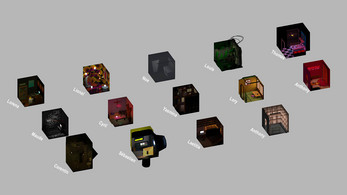-
-
Notifications
You must be signed in to change notification settings - Fork 1
New issue
Have a question about this project? Sign up for a free GitHub account to open an issue and contact its maintainers and the community.
By clicking “Sign up for GitHub”, you agree to our terms of service and privacy statement. We’ll occasionally send you account related emails.
Already on GitHub? Sign in to your account
Post-Mortem: First workshop "Magic Doors" #30
Comments
What is Magic Door ?https://youtu.be/KD47s4uWAIw |
What was produced at the end ?
Video |
What went well ?
|
What when wrong ?Sample scene
Meta GUID duplication
WorkaholicIf you are workaholic and you work after work or the weekend. You can work on the code of your team as you don't have permission to do so. Your only option is to fork the code of your friend. Remove his package and add yours.... Or to wait patiently. That can quickly lead to problems. LicensingSome participants did not understand that they could create dependency to paying asset on the store. Leading them to put some asset in the package that was public for the project. (We deleted the package immediately). |
What do I tip you to avoid?
What do I tip you to do?
|
What I learned ?Always evolving
You need plenty of toolsTo reduce the time lost when you do the package or when you use the package, you need plenty fo tools. And that request a learning curved and some tools that don't bug. Else you start losing a lot lot lot of time. 80% Package 10% Project 10% Bridge ScriptMore you use the package, more you start truning your project in a link of package that are linked to the small part that is creating your project. But the weak point of that is that you start to transform everything you do as a package. Lot's of bad stuffs happens with that (Explain later). Pierre Gueran gave a good tips & trick about that: "Don't do a package directly in the project. Start by doing the code for your team. Next project you required the package. Start to schedule to package it." ForkHow and why you should use the power of Fork in the project. CorrectionDuring the weekend, the participant are not available. So if you want to change the code, you have only one option.
Risk of rage quit.During the end of the project. I know it would not happens, but I was sitting on a new dilemma. So what do you do in this case ?
I suppose there are other solution. But for the moment it is all I have in head. |
ExperimentGoogle Sheet to synchronize the team work.Group workspace: Google Sheet |
The workshopBefore we start, the workshop scheduling was not to teach only the package manager but the virtual reality to participant that don't own virtual reality. You can find in the following part, the scheduling given to participant durant the workshop. ArtDay 1 - Day 2 - Day 3 - Day 4 - Day 5 - Day 6 Code |




For three weeks, we did a workshop with the Belgian students of Technocité call Magic Doors.
The workshop was a success, I am planning to re-iterate the experiment.
This post is a postmortem to make a review of how it happens.
And how to improve the next workshop.
The text was updated successfully, but these errors were encountered: